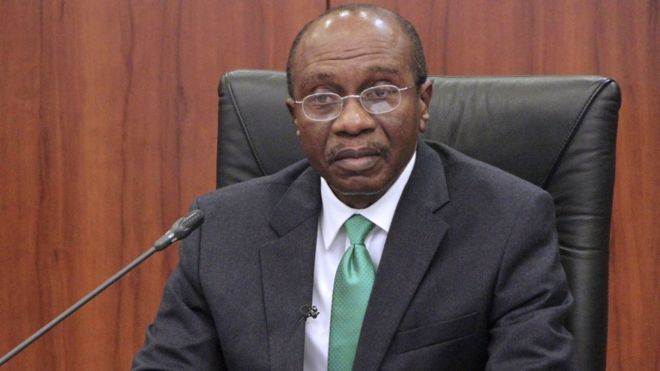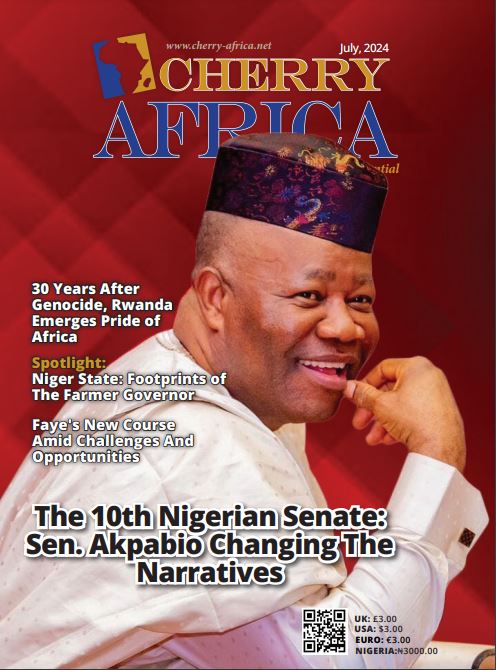The signs that the Nigerian economy has been in doldrums were palpable and frightening: 130 million Nigerians in poverty, representing 63 per cent of the nation’s population, according to the 2022 Multidimensional Poverty Index Survey released by the National Bureau of Statistics ( NBS); inflation rate that accelerated for the ninth straight month to 21.09% in October of 2022 from 20.77% in the prior month, which was the highest since September of 2005; a decline in Nigeria’s Gross Domestic Product from 173.5 trillion naira the third quarter of 2021 to 45.3 trillion naira the same period; then a partially paralysed naira, almost N800 to one dollar on the parallel market. This paints a scary picture.
With this in place, something drastic and expedient needed to be done. Therefore, it was not surprising that the Central Bank of Nigeria(CBN) seemingly concerned with ensuring stability in the financial system, announced two major monetary policies that would either lift the economy and save the naira. Analysts say these policies can also plunge the two deeper the steepness of declension if not dexterously implemented.
First, on October 26, Godwin Emefiele, Governor of the CBN, announced the issuance of redesigned naira notes. He said the circulation would begin on December 15, 2022. by the stroke of pen of this policy, the old Naira notes will cease to be legal tender by January 31, 2023.
This was quickly followed by a new cash policy that places a limit on cash withdrawals to N20,000 daily for Point Of Sale(POS) terminals; N100,000 weekly for private individuals and N500,000 for organisations and corporate bodies weekly.
In redesigning the naira, Emefiele gave four reasons: One, to address the issue of individuals who have made currency fraud their main source of income. There were challenges in the management of the existing banknotes in circulation, especially those outside the banking system. This portended dire consequences for the integrity of the CBN and the country. Top of the challenges, he said, was hoarding of the banknotes to the tune that N2.73tn out of the N3.23tn currency in circulation as of September 2022 was outside the vaults of the commercial banks across the country.
Two, it would help in reducing the growing kidnapping and ransom industry as the access to large sums used for ransom payment; three, it will aid in lowering the rate of inflation and regulate the amount of money in circulation.
Emefiele also said the worsening shortage of clean and fit banknotes; increasing ease and risk of counterfeiting evidenced by several security reports and compliance with global standard to circulate new legal tender every five to eight years.
He elaborated that the naira redesign would help to rein in the currency outside the banking system and make CBN’s monetary policies more effective as well as deepen its cashless economy drive.
He said: “On the basis of these trends, problems, and facts set out above, and in line with provisions of Sections 2(b), Section 18(a), and Section 19, subsections (a) and (b) of the CBN Act 2007, the Management of the CBN has sought and obtained the approval of President Muhammadu Buhari to redesign, produce, release and circulate new series of banknotes at N200, N500, and N1,000 levels.
“In line with this approval, we have finalized arrangements for the new currency to begin circulation from December 15, 2022 after its launch by President Muhammadu Buhari. The new and existing currencies shall remain legal tender and circulate together until January 31, 2023 when the existing currencies shall cease to be legal tender.”
The CBN announcement of the naira note redesign elicited reactions among experts and other agencies of government.
For instance, the Minister of Finance, Budget and National Planning, Zainab Ahmed, during the budget debate of the Ministry of Finance, Budget and National Planning in the National Assembly, said the CBN did not consult her ministry before taking the decision to redesign naira notes.
She said even though one of the reasons for the decision is to manage inflation, consequences are sure to follow.
“We were not consulted. It was an announcement that we heard. Part of the reason that was advocated is that it is one of the ways to mop up the liquidity to manage inflation.
“But there are also consequences – we are looking at what the consequences will be. There will be some benefits but there will be some challenges.
“And I don’t know whether the monetary authorities have actually looked very closely at what the consequences are and how they will mitigate it.”
However, President Muhammadu Buhari came to Emefiele’s defense when he said his administration will not go back on the plan by CBN to redesign the nation’s highest currency notes.
Buhari said this in London, UK, shortly after meeting with King Charles III at Buckingham Palace.
Also, the CBN Director in charge of Corporate Communication, Mr. Osita Nwanisobi said the CBN management, in line with provisions of section 2(b), section 18(a), and section 19(a)(b) of the CBN Act 2007, duly sought and obtained the approval of President Muhammadu Buhari in writing to redesign, produce, release and circulate new series of N200, N500, and N1,000 banknotes.
Nwanisobi urged Nigerians to support the currency redesign project.
He said currency management in the country had faced several escalating challenges which threatened the integrity of the naira, the CBN, and the country in general, adding that every top-rate central bank was committed to safeguarding the integrity of the local legal tender, the efficiency of its supply, as well as its efficacy in the conduct of monetary policy.
Part of the fears expressed by experts was that the dollar which has been on a steep rise in value against the naira may continue to promote the downward slide.
And true to the concerns, the sharp fall of the naira against the foreign currencies continued just after the announcement with the British Pound crossing N1,000 in the parallel market. Now, its about N925 to one pound.
Predictably, a few days after the announcement was made, the naira hit new lows against the dollar in the parallel (black) market. A dollar which earlier exchanged for about N700 hit almost N850 within days.
Also, as a result of the redesign policy, naira notes minted as far back as over a decade ago, were back in circulation. It was reported that bundles of cash minted in 2005 and 2008 were deposited in banks in a bid to beat the CBN deadline. Emefiele confirmed this when he said the bank has retrieved more than N1 trillion since its launch of new naira notes in a bid to move cash back into the banking system.
However, one of the secretive things about the naira design was the inability of the CBN to disclose how much it spent to carry out the exercise.
The apex bank was reported to have spent N281.07 billion to print bank notes between 2016 and 2020 and another N3.88 billion to destroy mutilated notes within the same period.
Experts say over N500 billion must have been spent to redesign this, questioning the rationale to spend such an amount at a time the economy is still in crisis. However, it is still in the realm of estimations.
The New Cash Withdrawal Policy
As the controversy surrounding the redesigning of the naira was still raging, the CBN on Tuesday, December 6, 2022, issued a new directive to banks and other financial institutions to reduce cash transactions in the country.
According to a new memo to banks signed by the Director of Banking Supervision, Haruna .B. Mustafa, individuals will only be able to withdraw N100,000 per week ( from over the counter, Point of Sale Machines or the Automated Teller Machines), while organisations can access N500,000 per week.
The memo among other things, stated: “Further to the launch of the redesigned naira notes by the President, Major General Muhammadu Buhari (retd.), on Wednesday, November 23, 2022, and in line with the cashless policy of the CBN, all deposit money banks and other financial institutions are hereby directed to note and comply with the following:
“1. The maximum cash withdrawal over the counter by individuals and corporate organisations per week shall henceforth be N100,000 and N500,000 respectively. Withdrawals above these limits shall attract processing fees of 5% and 10%, respectively.
“2. Third-party cheques above N50,000 shall not be eligible for payment over the counter, while extant limits of N10,000,000 on clearing cheques still subsist.
“3. The maximum cash withdrawal per week via Automated Teller Machine shall be N100,000 subject to a maximum of N20,000 cash withdrawal per day.
“4. Only denominations of N200 and below shall be loaded into the ATMs.
“5. The maximum cash withdrawal via the point of sale terminal shall be N20,000 daily.
“6. In compelling circumstances, not exceeding once a month, where cash withdrawals above the prescribed limits are required for legitimate purposes, such cash withdrawals shall not exceed N5,000,000.00 and N10,000,000.00 for individuals and corporate organisations, respectively, and shall be subject to the referenced processing fees in (1) above, in addition to enhanced due diligence and further information requirements.”
Part of the objectives of the policy according to the CBN, is that it aims at reducing the usage of cash and increasing the use of alternatives to cash due to the negative consequences of cash usage.
Other benefits include, the achievement of the nation’s vision 2020 objective; to reduce huge cost associated with cash handling (printing, storing, processing, distributing, etc); to increase convenience/access to payment (more payment options); to enable more transparency in payment systems, and allow for more effective monetary policy and to reduce cash-related crimes for safety of bank customers and the general public.
Accordingly, concerns have been raised by stakeholders. Top of these is the fear by political parties that the cashless policy will choke the political process, fundraising going into the 2023 general elections.
They argued that if Buhari had no access to funding in 2014, it would have been very difficult for him to win the elections. They also argue that the policy will create logistic problems, particularly in paying party agents nationwide will be difficult.
Governor Ahmadu Fintiri of Adamawa State accused Emefiele of targeting the political class with the new cash withdrawal limit.
The Director, Strategic Communications, National Election Management Committee of the PDP Presidential Campaign Council, Chief Dele Momodu, said the recent cash withdrawal policy announced would affect the parties’ funding activities, adding that “if enforced, the policy will strangulate the political process, not the PDP alone.”
He said: “Why make a policy that will largely affect the poor more than the rich? My worry is that most of our policies always target the poor. The PDP is worried about the poor market woman, the ordinary man on the street because we still run a cash-and-carry economy.”
On his part, the National Chairman of the Africa Democratic Congress, Chief Ralph Nwosu said the policy might pose a challenge to the parties, noting that the CBN did not carry out adequate sensitisation campaigns on it, stressing that it was politically motivated.
He said: ‘’How do you expect the ADC candidate to have the cash to do the things he wants to do and how do you think that this is the best time for such an undertaking?
‘’We have almost 200,000 agents that we must pay and 80 per cent of them live in rural areas. Is it that N2,000 or N5,000 that you pay them that you would transfer to each of them? How many of them have such a facility? So it’s completely inconsiderate of them.“
For the factional National Publicity Secretary of the Social Democratic Party, Alpha Muhammed, ’’you cannot overnight bring a policy that will seriously affect a project as big as the general elections.
‘’Definitely, cash has to move, people have to pay for logistics; you have to give cash to agents, you have to give cash to those who will transport people to rallies. It will definitely affect the success of the election and the campaign itself.’’
This was as the National Chairman and Presidential candidate of the African Democratic Party, Sani Yabagi said political parties would have logistical challenges if the policy implementation eventually takes off.
He said:“I think the government is trying to control the flow of money in circulation. We have all agreed that vote buying and selling is a cankerworm to our democracy. So, if the intention of the government is to curb the use of cash for vote buying, this will be good news for everyone.
“But will this not amount to killing an ant with a sledgehammer? Again, which is better: the medicine or the sickness? Government must think about this again particularly as it would affect the logistics of all the political parties.”
National Chairman of the All Progressives Grand Alliance, Chief Victor Oye said: “The poor will be affected no doubt but this is just a temporary measure. It is not going to last. It is part of the process to make the transition to the new currency seamless. The pain and difficulty will ease out very soon.
“Of course, it will take time for poor Nigerians to get used to this but they will eventually embrace it. Let me also add here that this is a process in the journey to a cashless economy. There will be a question or two about the timing, particularly with elections around the corner. Still, the rich and the poor should support it.’’
Contrarily, the spokesman of Obi-Datti Presidential Campaign Council, Yunusa Tanko said his party would not support waivers for parties, adding that this may be a ploy to stash money that could be used to buy votes during the polls.
Not finding the policy palatable, the House of Representatives last week summoned Emefiele and asked the CBN to suspend the new cash withdrawal policy.
This followed a motion of matter of urgent public importance moved by Aliyu Magaji (APC Jigawa) during plenary. In the motion, Mr Magaji said small businesses, which are the major drivers of the economy, depend on cash for transactions. He added that the owners of these businesses are going to be negatively impacted by this policy.
He said although the CBN has the statutory power to implement monetary policy, the policy will have a negative impact on the economy at large.
He said: “Although the Central Bank of Nigeria has the right to issue monetary policies on the Nigerian economy to be able to guide and direct the economy to the right path of recovery and growth, however, the new policy rolled out by the Central Bank of Nigeria (CBN) will definitely have a negative impact on the already dwindling economy, and further weaken the value of the Naira as Nigerians may resolve to use the dollar and other currencies as means of trading and thus further devalue Naira and weaken the economy.
“It is good to have a cashless policy but we seem to be borrowing ideas and policies from other countries that are far ahead of us. We are comparing ourselves with the United States and the United Kingdom. These people are far ahead of us. We will get there one day but this type of policy disturbs the people that voted for us.
“The issue affects everyone, most of our people are in rural areas and everything is being done in Naira and cash. And somebody will wake up and make a policy that will start tomorrow, no consultation.”
Emefiele after a meeting with President Muhammadu Buhari said there was no going back on the policy, no matter the degree of criticisms.
He said: ” I am aware that they (federal lawmakers) have asked for some briefings and we will brief them. But I think it’s important for me to say that the cashless policy started in 2012.
“But on almost three to four occasions we had to step down the policy because we felt that there is a need for us to prepare ourselves and deepen our payment system infrastructure in Nigeria.
“Between 2012 and now 2022, almost 10 years, we believe that a lot of electronic channels have been put in place that will aid people in conducting banking and financial service transactions in Nigeria.”
Fearing that more than a million POS Operators may lose their jobs if the new policy is implemented, the Association of Mobile Money and Bank Agents in Nigeria (AMMBAN) has written to the apex bank requesting exclusion from the policy.
AMMBAN in the letter dated: “All of these efforts are not aimed at making the CBN change her policy but for us agents to be recognized and enable us to have access to more funds better than the 20,000 a day as prescribed by the new policy.
“You will agree with me as agents that if all we can access is 100,000 a week /20,000 a day as cash for running our business, then we are practically out of business.”
There is no doubt that there will be severe consequences if the CBN goes ahead to implement the policy, both for the generality of Nigerians and the government and its regulatory agencies. How these issues are going to be mitigated is left to imaginations. Perhaps the CBN has shoulders that are broard enough to carry the weight.















